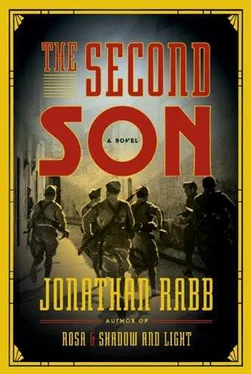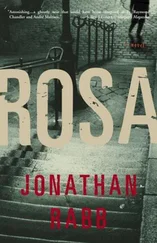Jonathan Rabb - The Second Son
Здесь есть возможность читать онлайн «Jonathan Rabb - The Second Son» весь текст электронной книги совершенно бесплатно (целиком полную версию без сокращений). В некоторых случаях можно слушать аудио, скачать через торрент в формате fb2 и присутствует краткое содержание. Жанр: Политический детектив, на английском языке. Описание произведения, (предисловие) а так же отзывы посетителей доступны на портале библиотеки ЛибКат.
- Название:The Second Son
- Автор:
- Жанр:
- Год:неизвестен
- ISBN:нет данных
- Рейтинг книги:4 / 5. Голосов: 1
-
Избранное:Добавить в избранное
- Отзывы:
-
Ваша оценка:
- 80
- 1
- 2
- 3
- 4
- 5
The Second Son: краткое содержание, описание и аннотация
Предлагаем к чтению аннотацию, описание, краткое содержание или предисловие (зависит от того, что написал сам автор книги «The Second Son»). Если вы не нашли необходимую информацию о книге — напишите в комментариях, мы постараемся отыскать её.
The Second Son — читать онлайн бесплатно полную книгу (весь текст) целиком
Ниже представлен текст книги, разбитый по страницам. Система сохранения места последней прочитанной страницы, позволяет с удобством читать онлайн бесплатно книгу «The Second Son», без необходимости каждый раз заново искать на чём Вы остановились. Поставьте закладку, и сможете в любой момент перейти на страницу, на которой закончили чтение.
Интервал:
Закладка:
She was always very good with the prompting. Not yet forty, Elena might have been the perfect opportunity for a healthy father-in-law living within arm’s reach, but both of them had been smart enough not to play out that farce. Hoffner nodded, trying to catch his breath as the boy raced back to the sofa and thrust the page onto his lap.
The only thing even remotely familiar on the paper was the drawing of a silver-star badge-or at least that was how it was described. It had recently become Mendel’s signature piece and was about two-thirds the way up on a big black blob, which meant that the blob was Hoffner. A few weeks back, the boy had been given a book on cowboys from Lotte’s father, an insufferable fan of the American West. With very little encouragement, Hoffner had pointed out that a sheriff was a kind of policeman, whereupon Mendel had instantly assigned that role to him. Lotte’s father remained less than pleased.
As to the “letters” Elena had mentioned, there were various scrawled lines and curls above the blob, the nearest thing to German an upside-down A , that looked more like a capsized boat than anything else. Still, it was three little clumps of something, with the A at the end.
“ ‘Opa,’ ” said Hoffner, reading. “How wonderfully you’ve drawn it.”
The boy dug himself into Hoffner’s side as he peered at his own work. “And that’s your badge there,” he said.
“Yes, of course. I saw it at once. Thank you, Mendy. We’ll put this one up with the others.”
“Can I see it?”
This, too, was part of the ritual, the handling of the badge. Instinctively, Hoffner reached for his pocket before he realized his badge was no longer there. He might have felt a moment’s regret-his first and only for this afternoon’s events-but instead, he chose to ignore it. Even so, he had grown fond of watching the boy gaze at the thing, hold it up to his shirt, bark out orders. Pride required so little in the very young.
Hoisting himself up, Hoffner said, “I think it’s time we get you your own badge, Mendy. A deputy’s badge. What do you say to that?”
So much for not riling up the boy. The moment of primal excitement quickly gave way to an equally deep despair as Mendy was told that the promised badge was, as yet, unpurchased. Hoffner’s only recourse was to give in to the nightly plea: eating dinner with the boy, or least sitting with him while he struggled to master a fork.
Fifteen minutes later, Mendy sat on a high stool at the kitchen table-Hoffner seated by his side-as Elena put the last of the little meal together. Mendy placed his hands on the table and began to teeter himself back and forth. Instantly, Hoffner grabbed hold of the stool.
“I won’t fall,” said the boy. “I’m balancing.”
Hoffner kept his hand on the stool. “Not a good idea, Mendy.”
“But I won’t. I promise. I won’t.”
Elena set a plate of tiny chicken pieces, potatoes, and spinach in front of the boy. She then placed a glass of beer in front of Hoffner.
“Eating time, Mendy,” she said. Her tone was one that everyone in the house had learned to obey; Hoffner quickly took a sip of his beer. “If I see you balancing again,” she said, “we go to the quiet place. Understood?”
Hoffner had never visited the quiet place-a closet under the stairs-although he had heard tales of it. According to Mendy it was filled with shadows, creaking wood, and even a few monsters. Mendy, however, had learned not to mention the monsters. They had not impressed Elena.
“Is it good?” said Hoffner, as the boy speared a second piece of chicken and shoved it into his mouth. Mendy had a remarkable talent for fitting an entire plate’s worth of food inside his cheeks before starting in on the chewing. Hoffner saw the boy going in for a third, and said, “I’d work on those before taking another, don’t you think?” Hoffner bobbed a nod toward Elena, who was at the sink washing up. “You wouldn’t want to … you know.”
Mendy thought a moment, then nodded slowly as he pulled back his fork. Chewing, he said, “She likes it when I finish quickly.”
Hoffner said, “She likes it when you don’t choke.”
This seemed to make sense. Mendy nodded again and, continuing to chew, said, “Did Papi have a quiet place when he was little?”
It was always questions about Georg these days-badges, forks, trips away: did Opa go away quite so often when Papi was little? This happened to be a particularly reasonable one. The trouble was, Hoffner had never spent much time with Georg at this age-at any age, truth to tell. It made the past a place of reinvention.
“Yes,” said Hoffner, “I think he did. Right under the stairs, as a matter of fact.” There had been no stairs in the old two-bedroom flat.
Mendy swallowed and whispered, “Did it have monsters?”
Hoffner leaned in. “Not after we got rid of them.”
The boy’s eyes widened. “Really?”
Hoffner nodded quietly. “Maybe you and I can do that sometime.” Before Mendy could answer, Hoffner plucked a piece of chicken from the plate and popped it into his own mouth.
Mendy said loudly, “Opa is eating my food.” Hoffner put on a look of mock panic as Elena, without turning, said, “Opa can go to the quiet place, too, if he’s not careful.”
Mendy stabbed at a clump of spinach, studied it, and shoved it in. “If she sends you, I’ll go with you,” he whispered. “That’d be good for both of us.”
Hoffner brought his hand to the boy’s face and drew his thumb across the chewing cheek. Mendy continued unaware and drove in another piece of meat.
It was all possible here, thought Hoffner. His only hope was to find his way to dying before he learned to disappoint this one.
Hoffner’s suggestion that he have dinner out was met with little resistance. Lotte’s parents-the Herr Doktor Edelbaums-had called to say how concerned they were with Georg still out of the country: wouldn’t it be best if they all dined together, Friday night after all? They would be over in half an hour.
Together, of course, meant just the family. There was always that moment of feigned surprise from the Herr Doktor when the “lodger”-Edelbaum’s infinitely clever title for Hoffner-put in an appearance: “No murders to be solved tonight, Herr Sheriff? So you’ll be joining us?”
Frau Edelbaum was a good deal more pleasant, though without any of the tools necessary to inject some tact into the proceedings. She would smile embarrassedly, say how lovely it was to see him again, and sit quietly with her glass of Pernod while her husband-perched at the edge of Georg’s favorite chair-played trains with Mendy. Hoffner would look on from the sofa and try desperately to time the sips of his beer with any attempts to engage him. And while this was perfectly unbearable, it was Mendy’s departure for bed, and the subsequent dinner conversation, that took them over the edge. In the end, Hoffner was doing them all a favor.
He stood with Lotte in the foyer as he slipped on his coat.
She said, “They won’t be here much past ten,” smoothing off one of his shoulders. “I’ll make sure.”
“Not to worry. Gives me a chance to see a few friends.” He pulled his umbrella from the stand. “It’s not as horrible as you think.”
“Yes, it is. You detest him.”
Hoffner fought back a smile. “Tell him they let me go for being a Jew. That should cause some confusion.”
“He’s more frightened by all this than you know.”
Hoffner shook the excess water from the umbrella. “He has good reason to be.” He buttoned the last of his buttons. “I’ll be sorry to miss the chicken. You’ll save me a piece?”
“It’s already in the icebox.”
He leaned in and kissed her on both cheeks. “They won’t treat me nearly as well in Spain, you know.” He saw her wanting to find the charm in this, but it was no good. “I shouldn’t tell them about any of that,” he said. “I’d hate to have your father pretending concern for me just for your sake.” Not waiting for an answer, Hoffner opened the door and stepped out into the rain.
Читать дальшеИнтервал:
Закладка:
Похожие книги на «The Second Son»
Представляем Вашему вниманию похожие книги на «The Second Son» списком для выбора. Мы отобрали схожую по названию и смыслу литературу в надежде предоставить читателям больше вариантов отыскать новые, интересные, ещё непрочитанные произведения.
Обсуждение, отзывы о книге «The Second Son» и просто собственные мнения читателей. Оставьте ваши комментарии, напишите, что Вы думаете о произведении, его смысле или главных героях. Укажите что конкретно понравилось, а что нет, и почему Вы так считаете.












